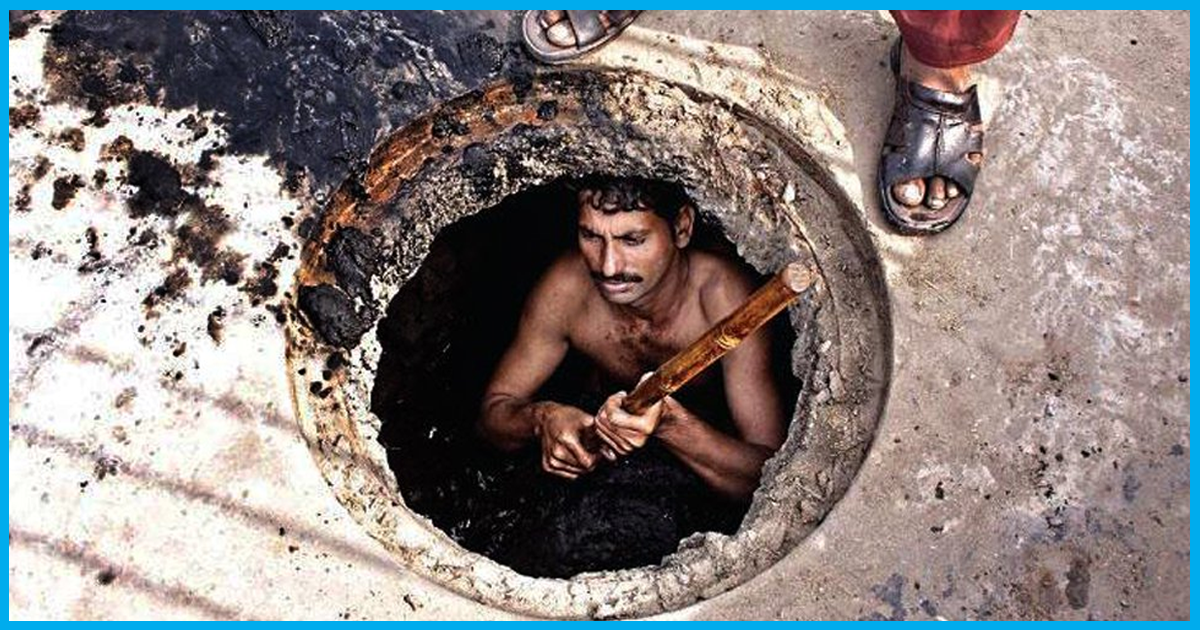
Manual Scavenging Is Banned In India; Know About It
8 Jun 2017 11:52 AM GMT
Manual scavenging is banned in India. Any contact between excreta and a labourer employed to unclog a drainage pipe or sewage treatment plant is prohibited by law and the occurrence of such a trespass or the non-provision of safety gear or disinfectants to the labourer will lead to the prosecution of the contractor and the employer – and rightly so.
Manual scavenging in India – a few basic pointers
- Manual scavenging is prohibited in India.
- Across India, there are over 12 lakh manual scavengers.
- Among them, more than 22,000 deaths are reported each year.
- Many suffer from jaundice, tuberculosis and acute liver malfunctions.
In March 2014, the Supreme Court declared that there were 96 lakh dry latrines being manually emptied. And as per reports received from the States and Union Territories in 2016, 12,226 manual scavengers have been identified so far.
According to a report tabled in the Rajya Sabha in 2016, 22,327 lose their lives every year due to manual scavenging. The Supreme Court had directed authorities to pay a sum of Rs 10 lakh to the affected families; however, the families had received only about Rs 60,000.
Government measures against manual scavenging
The Prohibition of Employment as Manual Scavengers and their Rehabilitation Act, 2013 provides for the prohibition of employment of people as manual scavengers and the rehabilitation of manual scavengers and their families.

The Ministry of Social Justice & Empowerment implements a “Self Employment Scheme for the Rehabilitation of Manual Scavengers” (SRMS). This provides the following:
- One-time cash assistance of Rs 40,000 each to the identified manual scavengers;
- Loan for undertaking livelihood projects upto Rs 15 lakh at concessional rate of interest;
- Credit linked capital subsidy upto Rs 3,25,000;
- Skill development training upto two years with stipend of Rs 3000 per month.
The government aims for an India without manual scavenging by 2019.
Why does manual scavenging continue in India?
However, manual scavenging still survives in parts of India without proper sewage systems or safe fecal sludge management practices. It is most prevalent in Gujarat, Madhya Pradesh, Uttar Pradesh, and Rajasthan. Moreover, the Prohibition of Manual Scavengers Act has not been implemented properly as manual scavenging continues and manual scavengers continue to die.
An estimated 62,000 million litres per day (MLD) of sewage is generated in urban areas; only about 30% of this waste goes through treatment plants. The rest is dumped into rivers, seas, and wells. Furthermore, 85 million people in urban India lack adequate sanitation. These numbers are only for urban India; numbers for rural India are worse.
The percentage of households practicing open defecation as on 31 March 2015 is 55.21% according to numbers released by the Lok Sabha.
The major reason for continued existence of manual scavenging is existence of insanitary latrines. These are latrines without water, where the excreta must be physically removed. Another major contributor to the continued existence of this crime is the Indian Railways. Many train carriages have toilets dropping the excreta from trains on the tracks; scavengers are employed to clean these tracks manually.
The Logical Indian take
Manual scavenging is modern-day slavery. That it continues in 21st century India is something that should horrify and outrage us all. At the same time, it is important that we ensure that further deaths due to manual scavenging do not occur.
The Prohibition of Manual Scavengers Act should be implemented with more efficiency; the governments at the centre and the states should establish that manual scavenging will not be tolerated and lawbreakers will be punished. Also, alternate means of employment should be generated for the impoverished people who are forced to become manual scavengers due to lack of alternatives means of livelihood.
 All section
All section













